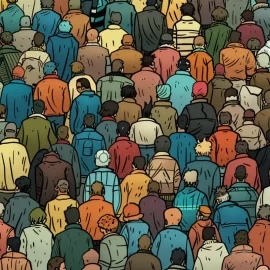
This is a free excerpt from one of Shortform’s Articles. We give you all the important information you need to know about current events and more.
Don't miss out on the whole story. Sign up for a free trial here .
Why are people concerned that the end of democracy might be near? What’s causing the “democratic recession”?
According to experts, some of today’s world leaders are beginning to chip away at democratic norms. Labeled as authoritarians, these leaders threaten to end democracy by feeding into societal dissatisfaction with the political climate.
Keep reading to learn why the end of democracy could be on the horizon and what the future holds.
What’s Chipping Away at Democracy?
In a 2022 report, research and advocacy group Freedom House asserts that the world is in its 16th year of a “democratic recession” that has the potential to spur the end of democracy. Many countries are veering away from democratic ideals and leaning toward more autocratic norms—and it’s largely due to a new breed of leaders: elected authoritarians.
According to Freedom House, 60 countries suffered a decline in freedom in the past year, and only about 20% of countries can now be classified as “Free.” The rest are considered either “Partly Free” or “Not Free.” While many “partly free” countries are still technically democracies where citizens can vote, Freedom House argues that democracy entails more than just holding elections. A truly democratic country must also have a government that is held accountable with checks and balances and that respects the rights and equality of its people.
Gideon Rachman, author of The Age of the Strongman: How the Cult of the Leader Threatens Democracy Around the World, argues that it’s not just a trend but the dominant political trend: Strongman-led countries include the two most populous in the world (India and China) and in Latin America (Mexico and Brazil) as well as four out of five members of the United Nations Security Council (China, Russia, the US under Trump, and the UK under Boris Johnson).
Why do some experts warn that the new authoritarians are leading their countries towards the end of democracy?
New Authoritarians
In the past, it was easy to spot authoritarians—they used brute force and blatant fascism to concentrate power. But today’s strongmen have learned from the mistakes of ousted autocrats and recognize that subtlety is the best strategy for longevity and impunity. According to some observers, they threaten the end of democracy by maintaining only a veneer of democracy while stealthily furthering their own agendas—for example, they’ve set up organizations masquerading as citizen groups lobbying for their government on the international stage.
A Sense of Dissatisfaction
While not necessarily losing faith in democratic ideals, many are dissatisfied with democracy in their own countries. According to research by Cambridge University’s Centre for the Future of Democracy, millennials are especially disillusioned. This may be a result of “transition fatigue” in places like Latin America, Africa, and southern Europe. The end of democracy appeals to younger generations who didn’t have to fight for their freedom and have no memory of what it’s like without it; at the same time, they’re experiencing inequality and unemployment first-hand in what is supposed to be a functioning democracy.
In relatively young democracies, there may be no solid understanding of what a democracy actually is. One example is Hungary, which transitioned to democracy in 1989. Having been ruled by strongmen in the past, Hungarians have no model of a democratic leader, which allowed prime minister Viktor Orbán to define the role on his own terms. He changed the Constitution to help him gain control of the legislative and judiciary, shut down opposing voices, and promote anti-immigration policies that many see as racist.
And in other countries, people calling for the end of democracy may have grown tired of democratic processes—the endless debates, arguments, and consensus-seeking—preferring the single-mindedness and swift, decisive actions of authoritarians.
What Does the Future Hold?
Observers disagree on how long this trend will last—while some believe it to be a slippery slope that could ultimately lead to the end of democracy if left unchecked, others contend that strongman rule is unstable and thus bound to collapse. The problem, as Rachman points out in The Age of the Strongman, is that there will be much turmoil before that happens. And even though democracies may not be devolving into full-scale autocracies, the danger is that countries that suffer democratic blows typically don’t recover quickly.
To reverse the trend towards ending democracy, Freedom House says that it’s crucial to increase international coordination and develop policies that strengthen democratic systems and safeguard the freedoms and well-being of each country’s people. But more than developing policies, experts believe that it may be time to rethink democracy. They note that merely holding elections every few years is an outdated model as it doesn’t lead to an accurate representation of the will of the people, particularly on divisive issues. It’s necessary to revisit democratic institutions and systems that were established in the 19th century and restructure them to meet today’s challenges.
A New Kind of Democracy?
One possible change is to move toward a deliberative democracy, which enables citizens to become active participants in democratic processes beyond elections. This can be done through citizens’ assemblies, where a representative group of civilians can weigh in on issues that affect the population. For example, the Irish parliament commissioned a citizens’ assembly to deliberate on major issues affecting the Irish people, including abortion. After six months, the assembly recommended repealing an abortion ban. Ireland subsequently held a referendum, and the Irish people voted in favor of the recommendation.
Another way to avoid the end of democracy is by addressing “democratic myopia”—the short-term thinking that comes from having short electoral cycles. This can be done by forming offices for future generations that champion issues like climate change and population growth. Such issues would have profound effects on citizens who are yet to be born and necessarily require long-term thinking. (Wales appointed its first future generations commissioner in 2019.)
These suggestions and the current political climate indicate that we shouldn’t take democracy for granted—it can only survive if we actively work on it, reform it, and find more ways for citizens to be involved. In this way, the people—and not an autocratic leader—will hold the power.

Want to fast-track your learning? With Shortform, you’ll gain insights you won't find anywhere else .
Here's what you’ll get when you sign up for Shortform :
- Complicated ideas explained in simple and concise ways
- Smart analysis that connects what you’re reading to other key concepts
- Writing with zero fluff because we know how important your time is






